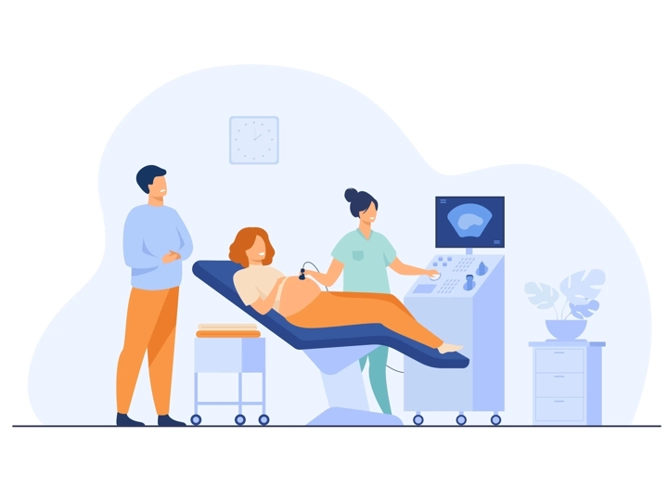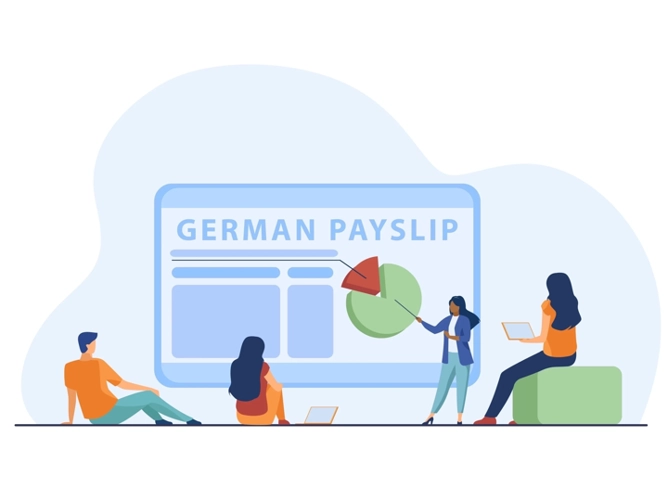
Having a Baby in Germany [2024 Guide] - Live In Germany
Having a Baby in Germany [2024 Guide] - Live In Germany
Pregnancy is entirely an exciting, pleasant but perturbing life-changing period for an upcoming parent. It comes with loads of consternating questions and queries related to many aspects of daily life and healthcare. In Germany, the entire child-bearing journey could be a superb experience for a mother-to-be, because of the high-quality and upright General and Prenatal (Vorsorgeuntersuchungen) Healthcare system of Germany.
So, while being in Germany, if you and your partner are hoping to hear the patter of tiny feet or on the way to the family, there must be many questions arising in your head that need to be answered.
What are Healthcare Services available in Germany for Pregnant (*Schwanger) women?*
Pregnancy Test in Germany
After having a pragmatic approach to having a baby, you need to conduct a pregnancy strip test (Schwangerschaftstest) for confirmation. At Pharmacies (Apotheke), the standard urine test kits for discerning early pregnancies are available with complete guiding instructions. They are handy in vending machines in some major cities as well. The accuracy rate of such tests is 98%.
If you’ve got your goal and the urine test is displaying a positive result, it’s time to happily approach the health care services for adequate and updated care.
German Health Insurance (*Krankenkasse)*
To get pregnancy costs covered, every pregnant woman in Germany is needed to be registered with German Health Insurance. From check-ups to childbirth, almost every expense is covered by Statutory Health Insurance.
If you are having Private Health Insurance, you need to know what comprehension, your insurance company is offering for pregnant mothers.
German Social Security Scheme
If you’re employed in Germany and paying into the social security scheme you can claim maternity leaves, and even a long fully paid maternity leaves. If your pregnancy is high-risk and you are suggested by the doctor to take a break from the work, the German Social Security Scheme can help you here.
Mother’s Passport (*Mutterpass)*
On your first visit to the doctor, you will have a Mutterpass. It is a mandatory small book-sized document a pregnant mother needs to carry with her on every doctor’s visit. All the necessarily required medical data about the expecting mother is documented in the Mutterpass.
Gynecologist’s (*Frauenarzt) appointment*
Appoint an OBS/GYN doctor and start having regular visits as suggested, from the 8th week of pregnancy. The basic examination like Blood pressure monitoring, weighing, pulse rate, and respiratory rate examination will be conducted and documented in the Mother’s pass (Mutterpass).
Other blood tests, urine analysis, pelvic examination, and Beta HCG levels update will be recommended by the gynecologist.
A test for Gestational Diabetes is conducted between the 24 to 28th gestational week. 2-14% of women suffer from gestational diabetes, which can complicate pregnancy.
Ultrasounds (*Ultraschall)*
Ultrasounds are commonly made on every prenatal care visit. On 25th gestational week, a 3D anatomy ultrasound (Feindiagnostik) is conducted to detect any serious medical issue with the baby’s anatomy.
Midwives (*Hebamme)*
In Germany, a pregnant woman can be appointed a midwife, for extra care. A foreigner can find an English-speaking Hebamme for herself in big cities in Germany.
To know more about the midwives, a full guide about Hebamme is available here.
Birth Preparation Class (*Geburtsvorbereitungskurs)*
Awareness is good..!! To get complete updated information about upcoming changes in your body and other possible complications, it is common in Germany to join a Birth preparation class. These are regularly conducted in hospitals and other facilities. You can check the timing and duration of the sessions on the websites. Every expecting mother is recommended to join the class in any hospital, or Red Cross or plan a private session with a midwife for birth preparation. The cost of the Birth Preparation Class is normally covered by Public Health Insurance.
Your partner is also recommended to join the class for awareness about the birth process.
Vaccination during Pregnancy in Germany
Vaccination is not mandatory for pregnant mothers in Germany. Robert Koch Institute’s committee sets yearly national recommendations about vaccination for pregnant ladies. Influenza vaccination is advised pre-birth. Post-partum recommended vaccines are DTP (Diptheria, tetanus, pertussis), Polio, HiB, MMR (measles, mumps, rubella), and chickenpox (varicella).
Places to give birth in Germany
Hospitals (*Krankenhausgebert)*
Hospitals are preferred facilities to give birth with all the necessities available in case of emergency.
In Germany, according to the protocol, during normal child delivery, your Midwife will be there to deliver your baby. God forbid if there is any emergency with the mother while delivering the baby, the consultant OBS/GYN doctor will be contacted by the hospital staff.
Midwives at Home (*Hausegeburt)*
If you are comfortable and healthy enough to give birth to your baby at your home, it is possible and allowed in Germany. Your midwife will be there to assist you during the procedure.
Birthing Center (*Geburtshaus)*
Birthing centres are Maternity clinics run by midwives. They are not equipped with any emergency facilities. The low-risk pregnancy cases are allowed to be delivered at birthing centers. If there is some emergency with the women giving birth in Birthing centers, midwives are responsible for immediately sending the women to the hospitals.
Parturition time in Germany
German maternity care practices thoughtful care for both mother and child. The mother stays for about 3-7 days in hospital care depending on her health condition. German nurses conduct continued check-ups and direct the mother about taking care of the child, helping and guiding in breastfeeding, changing diapers, and bathing the baby.
Child Health Examination Booklet
During the stay, a booklet-type document (Kinderuntersuchungsheft) for the newborn is issued same as Mutterpass. The basic health examination of the child is conducted during and after the hospital stay and is documented in that booklet.
Postpartum (*Wochenbett)* care of Mother and Child**
The Healthcare system in Germany facilitates the new mother with continued visits by your midwife.
You need to have these documents with yourself for an outright medical update:
- Your Mutterpass: as it contains all details regarding pregnancy
- Your Child’s examination book (Kinderuntersuchungsheft)
- Birth record (Bescheinigung) acknowledged by your doctor or midwife
Breastfeeding in Germany
In Germany, publicly breastfeeding your child is widely accepted. It is not taboo to breastfeed your baby in public. If anything, public places like restaurants, malls, etc provide facilities like women’s rooms or restrooms for such purposes.
Child Registration in Germany
You need to register your baby within seven days after the birth. Many hospitals assist and help in the process. You can register the baby’s birth at the local registry office (Standesamt) if the baby is born at home or at a birthing center. The child’s birth certificate is an important requirement to achieve social benefits in Germany.
German Citizenship for a baby born in Germany
Your baby can not automatically get German citizenship after being born in Germany. The mandatory requirements are:
- At least one of the baby’s parents must be German
- One of the parents is living in Germany for a minimum of 8 years, having permanent German residency status.
What makes Germany a Good place for having a baby?
Low cost of Giving Girth in Germany
The cost of maternity medication and other facilities in Germany is very low and affordable. If you’re having Public Health Insurance, it will be almost free of cost.
Holistic Medicines in Germany
In Germany, unlike other countries of the world, most women give birth naturally. The C-section (Kaiserschnitt) is not preferred unless there is any unavoidable complication.
Germany is among those countries where the use of antibiotic medications is possibly avoided. Homeopathy, acupuncture procedures, hypnobirthing, and natural medications are preferred to assist the child-birth.
Fully-Paid Long Maternity leaves (*Mutterschutz) in Germany*
In Germany, fully-paid maternity leaves last from 6 weeks before the expected due date of pregnancy till 8 weeks after the actual birth date of the baby.
If you are having multiple babies or any other complications the parental leaves can be extended.
Much Longer Fully-Paid Maternity Leaves in High-Risk Jobs
If an expecting mother’s workplace is potentially harmful, like a hospital, where the baby and mother are prone to get bacterial and viral infections, she can inform the employer and can get fully paid, and much longer maternity leaves.
Complete details regarding maternal leaves in Germany can be found in our Maternal Leave Guide.
Need Details on Maternal Leave?
Check out our detailed article on Maternal Leave (Mutterschutz) in Germany.
Paid Parental Leaves for the Father of the Baby
In Germany, the father is also allowed to take 2 months of paid parental leave. It is his own decision in which months he is going to take parental leaves.
An Employed Mother cannot Get Fired During Pregnancy
If you are an expecting mother whose pregnancy is tiring her from morning sicknesses and a nauseated stomach, don’t worry. You can rest at home; just inform your employer about your evident pregnancy. Your job is going nowhere. In Germany, it is almost impossible for an employer to fire a pregnant employee.
Child Benefits (*Kindergeld) in Germany*
Germany offers amazing benefits after having a child. The parent receives 219 EUR monthly for the first two children, 225 EUR for the third one, and 250 EUR from the fourth till how many you procreate. German government pays the Kindergeld till the child turns 18 and in some special cases until 25 years of age.
Family Benefits (*Familiengeld)*
In some German states, families with small kids can get family benefits. In 2022, you can have 250 EUR per kid monthly between his first and third birthday. You can get 300 EUR as familiengeld after having a third baby.
Day-care and Education in Germany
Germany offers standard and affordable day-care and education.
Bottom Line
The pregnancy itself is a long and care-demanding phase. Healthcare facilities in Germany are well-managed, patient advantageous, and recognized. Having a baby in Germany, the gestational period and the post-natal care can be an exhilarating experience for the parents. Adequate knowledge about the health care system of Germany and felicitous guidance can make the entire journey, tranquil and relishable for the parents. We hope this article was helpful in providing the proper information ahead of time.

Jibran Shahid
Hi, I am Jibran, your fellow expat living in Germany since 2014. With over 10 years of personal and professional experience navigating life as a foreigner, I am dedicated to providing well-researched and practical guides to help you settle and thrive in Germany. Whether you are looking for advice on bureaucracy, accommodation, jobs, or cultural integration, I have got you covered with tips and insights tailored specifically for expats. Join me on my journey as I share valuable information to make your life in Germany easier and more enjoyable.





